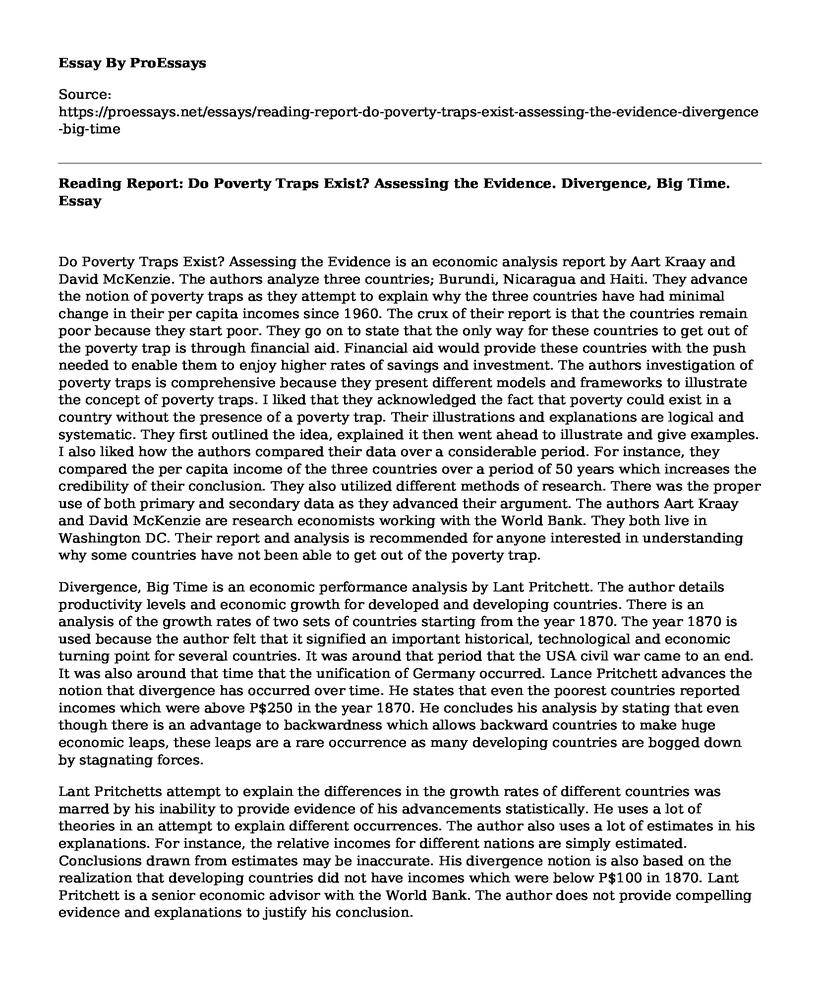Do Poverty Traps Exist? Assessing the Evidence is an economic analysis report by Aart Kraay and David McKenzie. The authors analyze three countries; Burundi, Nicaragua and Haiti. They advance the notion of poverty traps as they attempt to explain why the three countries have had minimal change in their per capita incomes since 1960. The crux of their report is that the countries remain poor because they start poor. They go on to state that the only way for these countries to get out of the poverty trap is through financial aid. Financial aid would provide these countries with the push needed to enable them to enjoy higher rates of savings and investment. The authors investigation of poverty traps is comprehensive because they present different models and frameworks to illustrate the concept of poverty traps. I liked that they acknowledged the fact that poverty could exist in a country without the presence of a poverty trap. Their illustrations and explanations are logical and systematic. They first outlined the idea, explained it then went ahead to illustrate and give examples. I also liked how the authors compared their data over a considerable period. For instance, they compared the per capita income of the three countries over a period of 50 years which increases the credibility of their conclusion. They also utilized different methods of research. There was the proper use of both primary and secondary data as they advanced their argument. The authors Aart Kraay and David McKenzie are research economists working with the World Bank. They both live in Washington DC. Their report and analysis is recommended for anyone interested in understanding why some countries have not been able to get out of the poverty trap.
Divergence, Big Time is an economic performance analysis by Lant Pritchett. The author details productivity levels and economic growth for developed and developing countries. There is an analysis of the growth rates of two sets of countries starting from the year 1870. The year 1870 is used because the author felt that it signified an important historical, technological and economic turning point for several countries. It was around that period that the USA civil war came to an end. It was also around that time that the unification of Germany occurred. Lance Pritchett advances the notion that divergence has occurred over time. He states that even the poorest countries reported incomes which were above P$250 in the year 1870. He concludes his analysis by stating that even though there is an advantage to backwardness which allows backward countries to make huge economic leaps, these leaps are a rare occurrence as many developing countries are bogged down by stagnating forces.
Lant Pritchetts attempt to explain the differences in the growth rates of different countries was marred by his inability to provide evidence of his advancements statistically. He uses a lot of theories in an attempt to explain different occurrences. The author also uses a lot of estimates in his explanations. For instance, the relative incomes for different nations are simply estimated. Conclusions drawn from estimates may be inaccurate. His divergence notion is also based on the realization that developing countries did not have incomes which were below P$100 in 1870. Lant Pritchett is a senior economic advisor with the World Bank. The author does not provide compelling evidence and explanations to justify his conclusion.
Cite this page
Reading Report: Do Poverty Traps Exist? Assessing the Evidence. Divergence, Big Time.. (2021, Sep 02). Retrieved from https://proessays.net/essays/reading-report-do-poverty-traps-exist-assessing-the-evidence-divergence-big-time
If you are the original author of this essay and no longer wish to have it published on the ProEssays website, please click below to request its removal:
- Thesis Example on the Relationship Between Migration and Unemployment among Migrants in Sweden
- Paper Example on Analysis of the Impact of International Trade on the Economic Growth
- Financial Crisis in Ireland 2008 Essay
- Sources and Uses of Cash Paper Example
- Essay Sample on Motivation Theories Explain Aspects That Inspire Employees
- COVID-19: A Global Economic Crisis on the Horizon? - Research Paper
- Essay Sample on Global Strategies: Enhancing Competitive Advantage Across Borders







